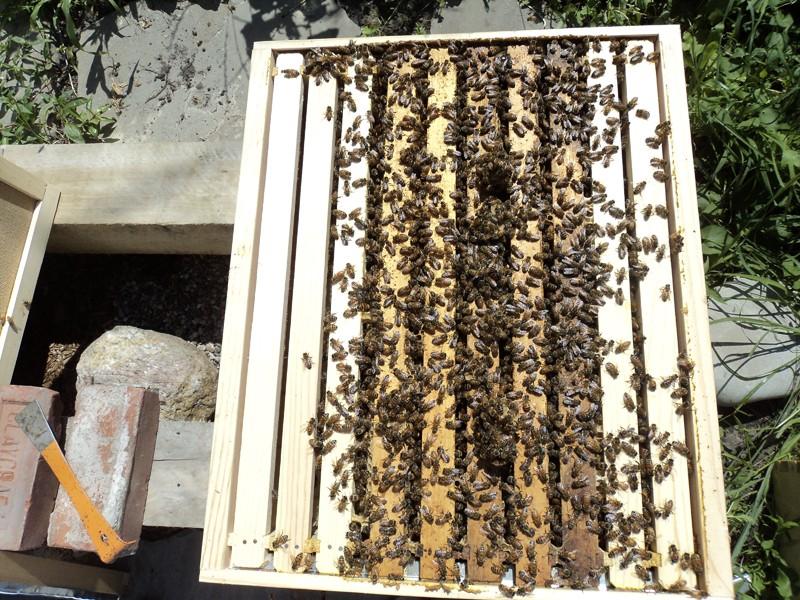What’s the buzz?

Courtesy Photo/ Ann Marie Fauvel
Oct 6, 2011
Professor Ann Marie Fauvel is catching a buzz, and she wants students at Grand Valley State University to jump on board.
Fauvel is working in tandem with GVSU student Jennifer Holt to establish a small apiary on the GVSU Meijer Campus in Holland, Mich. The apiary would consist of two small beehives that would be integrated into relevant curriculum on the Holland Campus, and serve as a basis of partnerships between various local organizations and K-12 education.
“In hopes of making this small campus a better, greener place to study, live and work, we started a green team a few years back,” Fauvel said. “We have been working on small but meaningful projects. …Coupled with my passion for bees and the enthusiasm on the campus, this project became a must… The surroundings are a perfect habitat for bees with plenty of foraging areas including Van Raalty Farms adjacent to the campus property.”
Fauvel and Holt submitted a grant proposal Friday and are still waiting for Risk Management to study the project and address all liability issues. Fauvel said if all goes well and the grant is approved, two beehives would be installed on the Holland Campus by the spring of 2012.
A beekeeper in her spare time, Fauvel, who teaches in the liberal studies department, sees bees as the perfect vehicle for interdisciplinary studies and said she dreams of sharing her passion for bees with not only GVSU students, but also the K-12 population and the entire community as a whole. Holt, who needed a practicum for her environmental studies major, climbed on board the project.
“She was looking for a practicum opportunity and I thought she would be the perfect candidate to help me bring my dream of keeping bees for education purposes at GVSU become a reality,” Fauvel said. “I had her put a bee suit on and introduced her to my bees – I keep bees at home… from that day on, she has studied bees from the very basic principles to the more advanced degrees of communication bees display. She enrolled in her practicum and has worked hard to put together a preliminary presentation and a grant proposal.”
Holt has also been working on starting her own bee keeping club, but is still looking for three other students who want to be officers and will be tabling during the upcoming Campus Sustainability Week to recruit more club members.
“I am confident that I can find at least enough students to meet the minimum requirement, at least initially,” Holt said. “I believe that once the club becomes a reality, we will attract many more students… Also, sustainability is a major interest to so many students and bees really are important facets of sustainability. This club will offer students to practice sustainability in a unique way.”
But with so many ways to promote sustainable alternatives, Holt and Fauvel’s efforts beg the question: why bees?
“It’s surprising how important something as small as a honeybee is to our society,” Fauvel said. “We depend on bees for an indispensable amount of our food.”
According to the U.S. Department of Agriculture, about one-third of the human diet comes from insect-pollinated plants and the honeybee is responsible for 80 percent of that pollination. Fauvel said bees are also responsible for pollinating alfalfa, which is used to feed cattle. Over the last decade, bee populations have dwindled and if numbers continue to decrease, Fauvel said the human diet would become much more restricted.
“The other fascinating aspect of honeybees is their incredible dynamics,” she said. “From history, to literature, politics, sociology, biology and many more, bees are an incredibly interdisciplinary subject of study. Their fascinating organization, communication and decision make a true model, worthy of consideration.”
The pair will also be giving a presentation during Campus Sustainability Week on their proposal to help highlight the connection of sustainability to beekeeping.
If the grant is approved, Holt said the next step would be to begin organizing the building and inauguration of the beehives, as well as working out the specifics of how the “living lab” will be used in GVSU classes and K-12 programs.
“‘Bee’ a keeper of the gentle — yes, I said gentle — fascinating, productive, industrious and indispensable honeybee,” Fauvel said.























